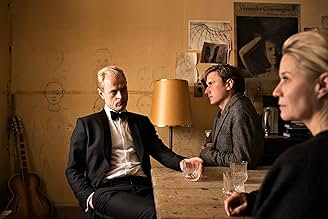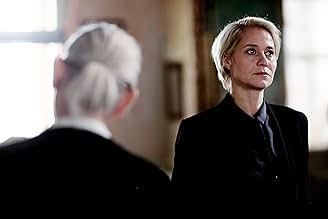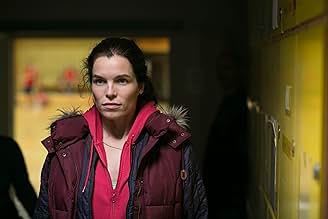IMDb RATING
7.6/10
3.4K
YOUR RATING
The death of a matriarch brings forgotten secrets out into the open and causes a prolonged battle for the family inheritance.The death of a matriarch brings forgotten secrets out into the open and causes a prolonged battle for the family inheritance.The death of a matriarch brings forgotten secrets out into the open and causes a prolonged battle for the family inheritance.
- Awards
- 15 wins & 7 nominations total
Browse episodes
Featured review
Signe Larsen, a young woman from relatively modest stock--working in a flower shop--discovers she was adopted and that her real family is a rich and decadent lot, fighting over the titular legacy of her recently deceased mother.
This sounds like a terribly worn out premise, but the writers actually succeed in transfiguring it by carefully avoiding the vulgar clichés we might expect: this is 'Dallas' alright, but 'Dallas' for the XXist century. The dead mother was not an oil magnate but a conceptual artist, the brothers and sisters are curators, lawyers and beach bums, all rather bohemian in their own privileged way. In place of gold watches and sports cars, we have conspicuous displays of cultural capitals (art books, white cubes and subdued designer dresses.) Behind this urbane and cultured façade, however, J. R. has nothing on any of them: Gro the curator dress her self-interest as selfless dedication to her mother's memory, Emil's devil-may-care altruism is fueled by privilege and self-indulgence, Thomas is perpetually escaping from his responsibility, and Frederik alone wears his stony heart on his sleeve.
The result is a populist Cinderella: Signe stands for honest work and common sense. Her decadent siblings, with their high-falutin modern culture and high-minded hypocrisy, are the fabled 'cosmopolitan elite'. But Avringerne is not *genuinely* populist: it is too well written, too well acted, too tastefully produced to appeal to the little man. Signe, pure as a lamb, perpetually turning the other cheek, is also the least compelling of the characters. This is a populist tale not for the little man but for the self-hating cosmopolitan elite.
The result is compelling: acutely observed, well cast, restrained and mostly credible. It does suffer from the failings of its soap opera model: as the episode count rises, the accumulation of peripeteia inevitably becomes less and less believable, so that by the end of the first season the viewer is already hard-pressed to suspend disbelief. By the end of the second, it has all become quite strained and repetitive. One wishes the writers had spread out their episode in time, avoiding thereby the artificiality of perpetual emergency and giving their characters time to grow.
This sounds like a terribly worn out premise, but the writers actually succeed in transfiguring it by carefully avoiding the vulgar clichés we might expect: this is 'Dallas' alright, but 'Dallas' for the XXist century. The dead mother was not an oil magnate but a conceptual artist, the brothers and sisters are curators, lawyers and beach bums, all rather bohemian in their own privileged way. In place of gold watches and sports cars, we have conspicuous displays of cultural capitals (art books, white cubes and subdued designer dresses.) Behind this urbane and cultured façade, however, J. R. has nothing on any of them: Gro the curator dress her self-interest as selfless dedication to her mother's memory, Emil's devil-may-care altruism is fueled by privilege and self-indulgence, Thomas is perpetually escaping from his responsibility, and Frederik alone wears his stony heart on his sleeve.
The result is a populist Cinderella: Signe stands for honest work and common sense. Her decadent siblings, with their high-falutin modern culture and high-minded hypocrisy, are the fabled 'cosmopolitan elite'. But Avringerne is not *genuinely* populist: it is too well written, too well acted, too tastefully produced to appeal to the little man. Signe, pure as a lamb, perpetually turning the other cheek, is also the least compelling of the characters. This is a populist tale not for the little man but for the self-hating cosmopolitan elite.
The result is compelling: acutely observed, well cast, restrained and mostly credible. It does suffer from the failings of its soap opera model: as the episode count rises, the accumulation of peripeteia inevitably becomes less and less believable, so that by the end of the first season the viewer is already hard-pressed to suspend disbelief. By the end of the second, it has all become quite strained and repetitive. One wishes the writers had spread out their episode in time, avoiding thereby the artificiality of perpetual emergency and giving their characters time to grow.
- bertrandma
- Sep 13, 2023
- Permalink
Storyline
Did you know
- TriviaArvingerne was sold to a number of other countries worldwide even before it had aired in Denmark.
- ConnectionsReferenced in Gintberg på kanten: DR (2015)
- How many seasons does The Legacy have?Powered by Alexa
Details
- Release date
- Country of origin
- Official sites
- Languages
- Also known as
- The Legacy
- Filming locations
- Langkildegaard, Svendborg, Fyn, Denmark(as Grønnegaarden)
- Production companies
- See more company credits at IMDbPro
Contribute to this page
Suggest an edit or add missing content





























